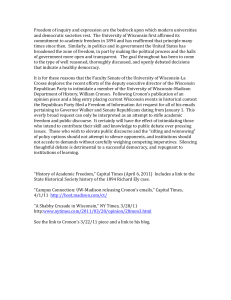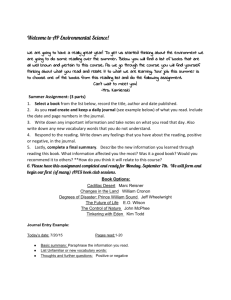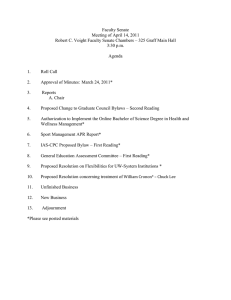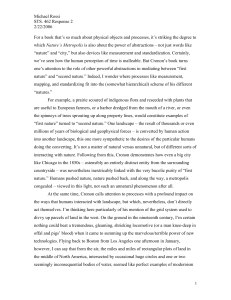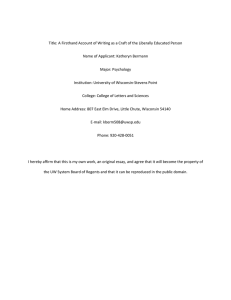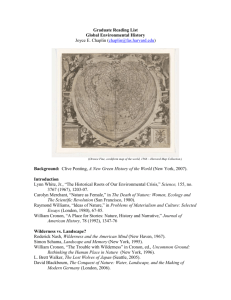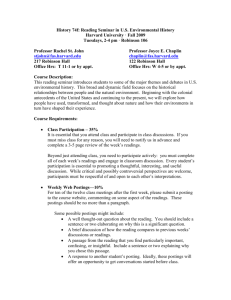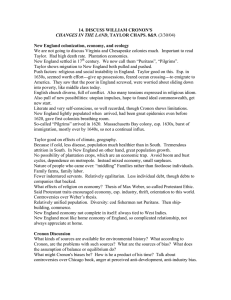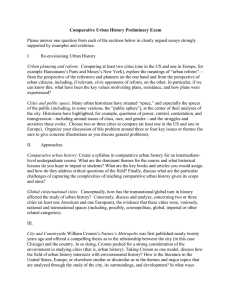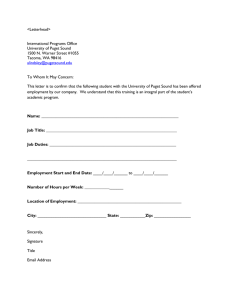WILLIAM CRONON At Home in the Anthropocene: Human Place(s) in Nature
advertisement
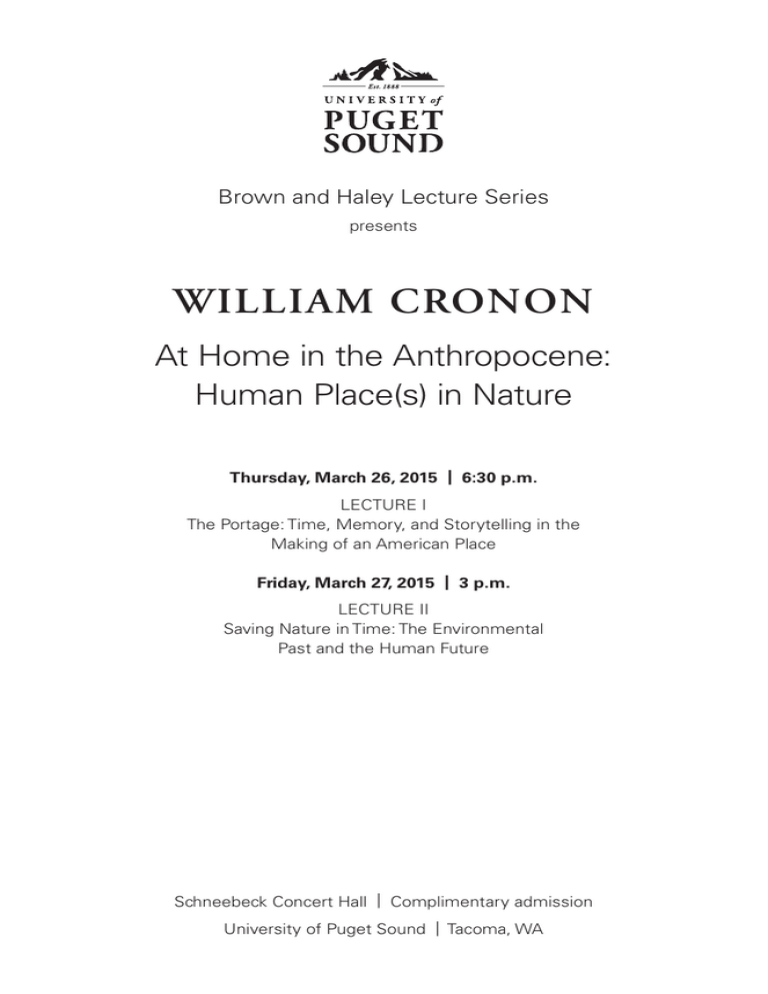
Brown and Haley Lecture Series presents WILLIAM CRONON At Home in the Anthropocene: Human Place(s) in Nature Thursday, March 26, 2015 | 6:30 p.m. LECTURE I The Portage: Time, Memory, and Storytelling in the Making of an American Place Friday, March 27, 2015 | 3 p.m. LECTURE II Saving Nature in Time: The Environmental Past and the Human Future Schneebeck Concert Hall | Complimentary admission University of Puget Sound | Tacoma, WA WILLIAM CRONON William Cronon is one of America’s leading environmental historians and a prize-winning author. He is the Frederick Jackson Turner Professor of History, Geography, and Environmental Studies at University of Wisconsin-Madison, and is a founding faculty fellow and former director of the university’s Center for Culture, History, and Environment. Born in New Haven, Conn., Cronon holds master’s and doctoral degrees from Yale University, and a Doctor of Philosophy degree from Oxford University. A student of American environmental history and the history of the American West, he was a Rhodes Scholar, Danforth Fellow, Guggenheim Fellow, and MacArthur Fellow, and served as president of both the American Society for Environmental History and American Historical Association. He has served on the national board of The Trust for Public Land since 2003, and currently is a member of the governing council of The Wilderness Society and numerous prestigious academies, including the American Academy of Arts and Sciences. Cronon is the author of Nature’s Metropolis: Chicago and the Great West and Changes in the Land: Indians, Colonists, and the Ecology of New England. He has received wide acclaim for his writings about humanity’s impact on the natural world, including the Bancroft Prize for the best work of American history and a nomination for the Pulitzer Prize for history for Nature’s Metropolis. The Brown and Haley Lecture Series is pleased to welcome William Cronon, to discuss his research on how humans interact with the natural world, how we modify the landscapes in which we live and work, and how our ideas of nature shape our relationship with the world around us. Thursday, March 26, 2015 | 6:30 p.m. LECTURE I The Portage: Time, Memory, and Storytelling in the Making of an American Place In a lecture based on the opening chapter of the book he is writing on the history of Portage, Wisconsin, environmental historian William Cronon meditates on the role of memory and storytelling in the complicated ways human beings construct their individual and collective sense of place. A natural ecosystem or an abstract geographical space becomes a human place, he argues, through the endless accretion of narratives that render that place meaningful for those who visit or live in it. Portage is an especially interesting community in which to explore this idea, since it was the home town of Frederick Jackson Turner, the American historian who authored the famous “frontier thesis.” It was also the town into whose hinterland John Muir migrated as an 11-year-old boy from Scotland, and the town where Aldo Leopold’s “Shack,” famed subject of the book A Sand County Almanac, is located. Although virtually unknown to most Americans, few places have played so central a role in shaping our national ideas of nature. Reception to follow in Wyatt Hall Atrium Friday, March 27, 2015 | 3 p.m. LECTURE II Saving Nature in Time: The Environmental Past and the Human Future In this lecture drawn from a book of the same title that he is currently completing, William Cronon analyzes key cultural assumptions about humanity and nature that have characterized modern environmental thinking in the United States for the past several decades. He will seek to understand how these unexamined assumptions have sometimes undermined the effectiveness of environmentalism as a political, social, and cultural movement. His goal will be to try to imagine how environmentalism might be more effective if its followers did a better job of mingling the natural and the cultural in the service of humane values. (Please turn off all cell phones and pagers. No photo or recording devices allowed.) THE BROWN AND HALEY LECTURE SERIES is designed to be a significant contribution from the perspectives of the social sciences and humanities to real or urgent problems confronting society. Distinguished scholars are invited to present a series of lectures funded by the Brown & Haley company. In previous lectures in the series, scholars have explored important problems in American and world political affairs; economic, ecological, and urban issues; French women writers; Mark Twain; freedom in Greek art; and many other areas in the humanities and social sciences. Originating in 1953, the Brown and Haley Lecture Series became the first fully endowed lectureship in the history of University of Puget Sound. For 60 years the lectures have played a significant role in enriching the intellectual life of students, faculty, staff, and the community. BROWN AND HALEY LECTURE SERIES COMMITTEE Kristine Bartanen Karl Fields D. Wade Hands Susannah Hannaford Susmita Mahato Douglas Sackman, chair Puget Sound is committed to being accessible to all people. If you have questions about event accessibility, please contact 253.879.3236, accessibility@pugetsound.edu, or pugetsound.edu/accessibility.
